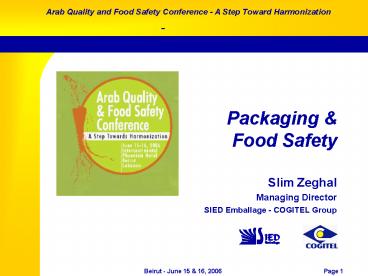Packaging PowerPoint PPT Presentation
1 / 24
Title: Packaging
1
Packaging Food Safety
Arab Quality and Food Safety Conference - A Step
Toward Harmonization
?????? ?????? ?????? ??????
-
????? 15 ? 16 ?????
- Slim Zeghal
- Managing Director
- SIED Emballage - COGITEL Group
2
Outline
- Introduction
- How food safety concerns affect our processes
- How food safety concerns impact our product
- Innovations
- Conclusions
3
Food safety critical path to the consumer
Introduction
Raw Materials
Raw Materials
converter
Agro-industry
Inks Glues Solvents Films
Packer
Regulator
Distributor
Design Agency
Vendor
Consumer
4
A definition of Packaging
Introduction
- A french proverb says
- The dress does not make the priest
- This is not true anymore in our new world
- The packaging does make the product !
5
A definition of packaging (continued)
Introduction
- Packaging is the Expression of the Soul of every
Product Peter Brabeck CEO Nestlé - Packaging provides the means of ensuring the safe
and traceable delivery of a product to the
ultimate consumer in sound condition at the
minimum overall cost and in an attractive and
informative fashion also caring for an easy usage
6
Implications for food safety
Introduction
- Safe delivery
- Traceability
- Sound condition
- ? protection
- Information
- Easy usage
- ? Reclosable
- ? individual servings
7
It all starts with quality procedures
Process
- ISO 9001 2000 version
- BHP
- BRC/ IoP
- HACCP
- ISO 22 000
8
It goes on with traceability
Process
Suppliers
Storage
Slitting
- Production controls
- Labels for each product
- Full traceability back to supplier production
team - ERP system
Printing
Ink
Lamination
glue
Customers
Slitting
9
Institutional framework
Process
- National industry upgrade program
- Helped finance laboratory equipment
- clean production environment
- information system
- Packtec
- Provides technical expertise
- advanced analytical techniques
- third party assessment for export to France
- Cepex, Foprodex, Famex
- Marketing communications efforts
- Export initiatives
10
Use of compatible materials
Process
- Alimentarity certificates from raw materials
producers - Measurement of residual solvents
- Ban of prohibited solvents (Toluene free)
- Migration studies packaging/packed product
interaction - compatibility
- Advice on materials
- selection
11
Types of Packaging Commonly Used
Product
- Shelf-Stable Packaging
- Traditional shelf-stable packaging consisted of
cans or glass jars. The newest shelf-stable
packaging uses plastic containers. So, instead of
opening a can of soup or stew, pouring it into a
pan and heating it, you can pull a plastic soup
package off the shelf and pop it into a
microwave. Such products can be safely stored on
the shelf without refrigeration. Assuming there
are no breaks or tears in the package, these
products should maintain top quality for more
than a year. - Packaging That Requires Refrigeration
- Vacuum Packaging
- With this method, fresh raw ingredients or
partially-cooked ingredients are vacuum-sealed in
a plastic pouch. The pouch is heat-processed,
then quickly chilled and transported under
refrigeration. Sous vide products must be kept
refrigerated. Like other vacuum-packed products,
sous vide products will last 3 to 4 weeks
refrigerated. To serve, you simply heat the bag
in boiling water. - Modified Atmosphere Packaging
- Oxygen in the package is mixed with a gas
(normally carbon dioxide and/or nitrogen) that
slows spoilage, discoloration, and the growth of
harmful bacteria. Vacuum packages now include raw
pork tenderloin, fully-cooked roast chicken, tuna
spreads, and tortellini. Some foods may require
additional cooking or heating before serving, so
always check the label.
12
The 10 most unwanted bacteria
Product
- Campylobacter jejuni
- Clostridium botulinum
- Clostridium perfringens
- Escherichia coli
- Listeria monocytogenes
- Salmonella Enteritidis
- Salmonella Typhimurium
- Shigella
- Staphylococcus aureus
- Vibrio cholerae
13
Materials selection criteria
Product
- Required barrier properties
- Oxygen other gases
- Humidity
- Aroma
- Light
- Required structural properties
- Closure
- Shelf stability
- Required processability
- High cadency packing
- Microwaveability
- Heat resistance
- Required consumption date limitations
14
Additional criteria
Product
- Cost effective!
- Practical
- Attractive
- Reclosable
- Adapted servings
- Temper evidence
- which also contribute to food safety!
15
Information traceability on the packaging
Product
Consumption date
Consumer information
Bar Code for identification
16
Drivers for change innovation
Innovations
- Social behavior
- Smaller family, Snacking habits
- Processed food vs natural
- Fridge, micro-wave
- Distribution sector
- Hypermarkets
- Supermarkets
- Specialized chains
- Proximity shops
- More marketing, communications design
- More export focus for the agro-industry
- Legislation
17
Innovations
- "Imagination is more important
- than knowledge."
- Albert Einstein
18
Zippers for reclosability
Innovations
19
Sleeves, decorative temper evidence!
Innovations
20
Holography anti-counterfeiting
Innovations
- Both decorative and a security feature
- Still mainly used for high end products, pharma
cosmetics - Usually combined with temper evidence features
21
RFID Big Brother in small packages
Innovations
- Advantages
- Better logistics for retailers
- Better product info
- Improved shopping experience
- Safety, traceability
- Disadvantages
- Cost
- Technology not mature yet
- Physical limitations
- No industry standard
RFID tag
Reader
Computer
22
Freshness indicators
Innovations
- Dynamic use-by date indication based on
microbial development simulation
Label is red bar code is veiled product is
spoiled
Label is transparent product is fresh
23
Contamination detection
Innovations
- Placing antibody-based tests on polymer packaging
films to detect pathogens or other selected micro
organisms. The insert sends a visual alert when
it encounters targeted spoilage bacteria, or
pathogens such as E-coli, Listeria and
Salmonella. - It will also alert consumers if chemicals such as
those used for pesticides are present in a food.
24
A call for action!
Conclusions
- "You may never know what results come from your
action. But if you do nothing, there will be no
result." - - Mahatma Ghandi

